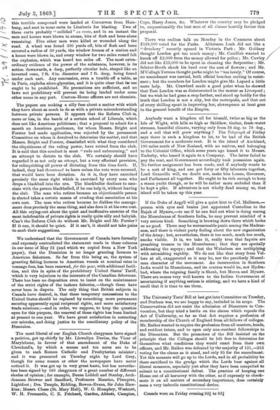The papers are making a silly fuss about a matter
with which they have about as much to do as with a private misunderstanding between private persons. It appears that the Reform Club is, more or less, in the hands of a certain school of Liberals, which does not like American politicians ; that a proposal to admit f or a month an American gentleman, for whom Messrs. Bright and Forster had made application, was rejected by the permanent Committee on whom it devolved to determine the matter, and that Messrs. Bright and Forster, dissatisfied with what they considered the cliquishness of the ruling power, have retired from the club. It is said that this conduct is most "rude and unbecoming," and an attempt to dictate to the club. We certainly should have regarded it as not only an attempt, but a very effectual provision, for relinquishing all power of dictating from this time forth. If, indeed, they had threatened to leave unless the vote were reversed, that would have been dictation. As it is, they have exercised precisely the same right which is exercised by every man who drops a blackball into the urn. The blackballer declines to asso- oiate with the person blackballed, if he can help it, without leaving the club. The man who retires because an objectionable person is elected takes a certain means of evading that association at his own cost. The man who retires because he dislikes the manage- ment does precisely the same thing, and also does it at his own coat. All this crying-out about the quiet and inoffensive exercise of the most indefeasible of private rights is really quite silly and babyish. Can't the Reform Club do without Mr. Bright and Mr. Forster? If it can, it should be quiet. If it can't, it should not take pains to snub their suggestions.






























 Previous page
Previous page